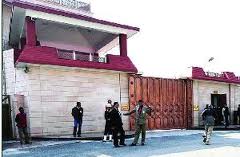
Lucknow, May 9: BSP chief Mayawati spent over Rs 86 crore of public money to renovate her 13 Mall Avenue bungalow that she is entitled to as a former chief minister. The renovation work began after Maya took over as chief minister in 2007 but the bulk of the work got completed towards the end of her tenure.
This was revealed in an RTI application that SP leader Shivpal Yadav filed when he was the leader of Opposition during Maya's tenure. Though the RTI plea dates back a year, the estate department revealed the details recently.
"We are still assessing the total cost incurred and indications are that the money spent might even exceed Rs 100 crore," a senior estate department official said on the condition of anonymity.
The house sprawls over 5 acres of prime land in Lucknow's Mall Avenue and is guarded by 20-feet-tall walls made of sandstone from Rajasthan. Originally, 13 Mall Avenue comprised only 2.5 acres, but Maya added an adjoining plot which housed the cane commissioner's office and had this building demolished.
The main building is single-storeyed and has six inter-connected rooms. They open on to a wide corridor, which contains rows of lockers. On a wall in this corridor hangs a neatly framed large picture of Mayawati taking her first oath as UP chief minister in 1995. Outside the corridor is a verandah with only two windows, both fitted with bullet-proof glass. Each window cost Rs 15 lakh and was specially designed for the house in Chandigarh.
There's a separate two-storeyed well-furnished guesthouse with 14 bedrooms on the same campus. All rooms have pink Italian marble flooring in keeping with Maya's fondness for pink stone. This building also has a meeting hall, a security room, garages and drivers' rooms.
The lush green lawn of the house that used to be its beauty was converted into a floor made of pink granite. There are two 20-feet statues on the premises, one of Mayawati and the other of her mentor later Kanshiram. Besides, there are five marble statues of elephants.
The buildings were not finished at one go, but involved tearing down of interiors several times because Maya was often not fully satisfied. One bathroom in the main building was redone about a dozen times because Behenji did not find it to her taste, an official said.
To secure the house, the home department put up a barbed fencing round the boundary walls. A close-circuit TV network kept close watch on visitors.
The renovation of this bungalow was clubbed with the building of parks and memorials erected in memory of Dalit icons. The job was assigned to the Nirman Nigam, which accorded top priority to the bungalow's renovation.
Shivpal Yadav, who's now PWD minister, said an inquiry has been ordered and action will be taken against those found guilty of any lapses and irregularities.
Estate department officials wished not to be quoted but said 80% of the funds spent were provided by the estate department. The remaining was spent by the Nirman Nigam and some other agencies like the Lucknow Nagar Nigam, home department and department of cultural affairs.
The Nirman Nigam, sources said, refused to take note of the estate department's repeated queries about its activities. The then director estate, Prabhat Mittal, though a letter dated August 27, 2008, had even asked the Nirman Nigam to furnish details about the money spent by it on demolishing the cane commissioner's officer. But the Nirman Nigam ignored the query.
Records show that 13 Mall Avenue was earlier known as the Speaker's House. This was long occupied by former Congress minister, late Baldev Singh Arya, who was even a minister in the first UP assembly of 1952. Mayawati occupied this house in 1995 when she became chief minister for the first time. In 2007, during her fourth stint as CM of the one of the poorest states in India, she decided to expand the property and do the building up in a royal style.





Comments
Add new comment